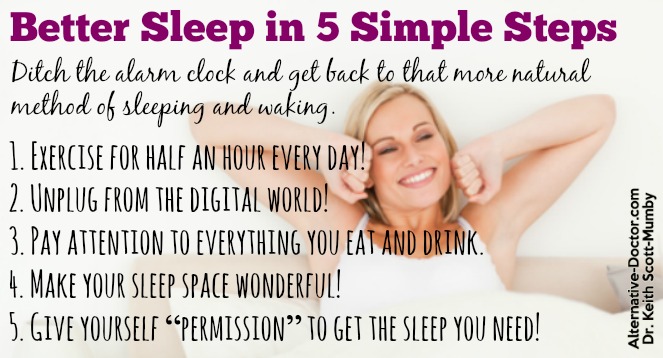I talk about the importance of sleep all the time because it the easiest, cheapest method to extend your life, slow aging, and maintain your overall health.
Getting good sleep is crucial to a longer, stronger life.
Your Morning Routine…Snoozed
Knowing how to wake up in the morning is the key to your entire day! In fact, that “snooze button” problem could be tanking your productivity and energy levels.
In the United States, about one-third of the population hits the snooze button more than three times every morning! People in their 20s and 30s – more than half of them – hit snooze.
No big deal, right? After all, nothing feels better than snagging a little “extra” time when your alarm goes off. A few more minutes to stay under the blankets doesn’t hurt anything!
Except for the fact that alarm clocks already disrupt brain activity – preventing you from natural wakefulness – and the snooze button repeats this process over and over!
The Rhythm of Sleep
Sleep deprivation can damage your memory, decision-making skills, ability to focus, and how you process information. In your body, there are three “rhythms” that regulate your system functions. You’re born with these “clocks” and they work throughout your life.
- Ultradian rhythms last less than twenty-four hours. Your heartbeat, digestive system, and the functions of your endocrine system – and its release of hormones – are all governed by ultradian rhythms.
- Circadian rhythms are cycles that last approximately twenty-four hours. The most well-known example of this type of rhythm is your sleep cycle.
- Infradian rhythms are those that last for longer than a day. A good example of the infradian rhythm is the female menstrual cycle.
If any of these rhythms are interrupted, the result can be body-wide chaos. A good signifier of this is how susceptible overnight workers are to weight gain and major depression.
REM sleep is crucial to your health. It is the deepest level of sleep, when your body repairs itself. When your alarm sounds, your body releases “fight or flight” hormones (cortisol and adrenaline) that jar you from peaceful sleep suddenly.
If you’re already depriving your body of sleep, the snooze habit makes it worse! Your mental clarity suffers and you may feel sluggish or confused until you “fully” wake up. To make matters worse, you probably supplement these feelings of exhaustion with coffee or sweets to give yourself a jolt.
You keep “fooling” your body with the snooze button (you’re getting more sleep) and coffee or energy drinks (artificial stimulation) – when the answer is very simple. Learning how to wake up in the morning starts with getting enough sleep in the first place!

3 Tips for Ditching the Snooze:
- Put your alarm clock across the room so you have to get out of bed to turn it off.
- Set it for when you “really” need to get up so you begin breaking the habit of using it.
- Use a peaceful method – such as music – that steadily increases in volume to bring you gently out of sleep.
A century ago, our ancestors didn’t have the option to “snooze” getting up. They didn’t even have an alarm clock! You can get back to that more natural method of sleeping and waking with a lot of practice.
Go to bed at the same time every night and get up at the same time every morning. Over time, your body will become accustomed to the routine and you’ll be able to wake without an alarm clock at all. This could take anywhere from a few days to a few months (set a backup alarm just in case) but you can train your own rhythms to the sleep pattern that’s best for you. Here are some other sleep tricks you can use.
Better Sleep in 5 Simple Steps
1. Exercise for half an hour every day! Nothing makes your body experience an incredible nights’ sleep like a brisk walk. No matter whether you do yoga, swimming, or take your pet around the block…get moving for the best sleep!
2. Unplug from the digital world! Whether your “drug” of choice is your television, computer, or smartphone, it causes your brain to be overstimulated right before sleep – making it harder to sleep and achieve that all-important REM sleep. At least an hour before you’re ready to sleep, shut it all down and allow your waking mind to rest.
3. Pay attention to everything you eat and drink. Cut back on coffee, alcohol, sugary treats, and especially cigarettes near bedtime since they cause inflammation. Make sure you stop eating solid foods a couple of hours before bed to keep from feeling overly full while trying to rest.
4. Make your sleep space wonderful! Consider a soothing shower before bed to wash away the grime of your day (even dead skin cells you’ve been shedding). When you climb into bed, make sure everything about your sleep space transmits “calm” feelings. From your sheets to your pillow to the color of your walls…environment matters!
5. Give yourself “permission” to get the sleep you need! You aren’t a slacker if you allow your body to have the eight hours every night that it needs to serve you well. A good sleep every night leaves you feeling energized and ready to face your day with a clear head. Make no apologies for that (not even to yourself).
The human need for sleep has been proven repeatedly. Everyone seems more concerned with how to wake up in the morning…rather than getting to sleep the night before!
Make sleep a priority in your life – starting right now. By giving yourself this particular “nutrient,” you are taking the first, most important step to a stronger you!
The post How to Wake Up in the Morning appeared first on Alternative Doctor Dev Site.
